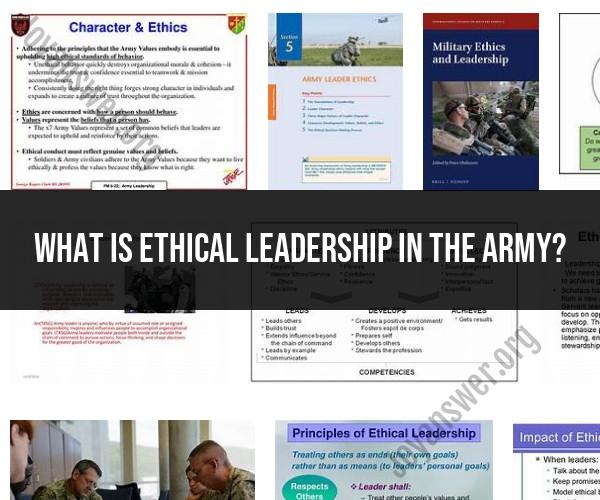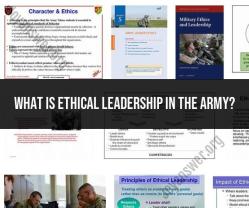What is ethical leadership in the Army?
Ethical leadership in the Army is a set of principles and values that guide the behavior and actions of military leaders at all levels. It emphasizes moral and ethical conduct, integrity, and accountability in the execution of duties and responsibilities. Ethical leadership is crucial in maintaining discipline, morale, and the trust of soldiers and the public. Here are some core principles of ethical leadership in the Army:
Lead by Example: Ethical leaders set the standard by modeling the behavior and values they expect from their subordinates. They adhere to the highest moral and ethical standards in their actions and decisions.
Integrity: Integrity is at the heart of ethical leadership. Leaders are expected to be honest, truthful, and transparent in their dealings. They do not compromise their values or principles for personal gain.
Accountability: Ethical leaders take responsibility for their actions and decisions. They hold themselves accountable and are willing to accept the consequences of their choices.
Respect for Others: Army leaders demonstrate respect for the dignity and worth of every individual, regardless of rank, background, or identity. They promote an inclusive and diverse environment.
Fairness and Justice: Leaders ensure fairness and impartiality in all aspects of leadership, including discipline, promotions, and resource allocation. They make decisions based on merit and without favoritism.
Trustworthiness: Ethical leaders are trustworthy and can be relied upon. Soldiers and peers trust them to make sound and ethical decisions.
Courage: Ethical leadership often requires courage to do what is right, even in challenging or difficult situations. Leaders must be willing to confront unethical behavior and make tough choices.
Professional Competence: Leaders are expected to be proficient in their duties and knowledgeable in their field. Ethical leadership is not just about values but also about competence.
Stewardship: Leaders are responsible for the well-being of their soldiers and the resources entrusted to them. They ensure that resources are used efficiently and effectively for the benefit of the organization and its mission.
Ethical Decision-Making: Leaders use a systematic approach to ethical decision-making. They consider the impact of their decisions on individuals, the organization, and society as a whole.
Mission Focus: While ethical leadership is important, leaders also prioritize the accomplishment of the mission. They balance ethical considerations with the need to achieve organizational goals and objectives.
Continuous Improvement: Ethical leaders strive for continuous self-improvement and the development of their subordinates. They seek feedback, learn from mistakes, and grow as leaders.
Adherence to Laws and Regulations: Leaders adhere to all laws, regulations, and policies governing military conduct. They ensure that their actions and decisions are in compliance with legal standards.
Ethical leadership is not only a moral imperative but also a strategic necessity in the Army. It fosters a culture of trust, discipline, and professionalism, which is essential for mission success and maintaining the Army's reputation. Ethical leaders are not only accountable to their superiors but also to the soldiers they lead and the nation they serve.


